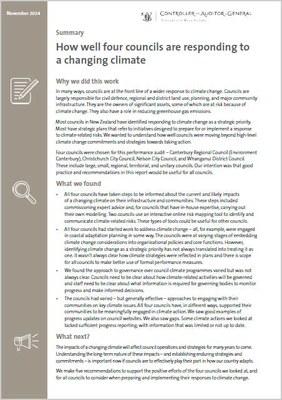Summary of our report
Why we did this work
 In many ways, councils are at the front line of a wider response to climate change. Councils are largely responsible for civil defence, regional and district land use, planning, and major community infrastructure. They are the owners of significant assets, some of which are at risk because of climate change. They also have a role in reducing greenhouse gas emissions.
In many ways, councils are at the front line of a wider response to climate change. Councils are largely responsible for civil defence, regional and district land use, planning, and major community infrastructure. They are the owners of significant assets, some of which are at risk because of climate change. They also have a role in reducing greenhouse gas emissions.
Most councils in New Zealand have identified responding to climate change as a strategic priority. Most have strategic plans that refer to initiatives designed to prepare for or implement a response to climate-related risks. We wanted to understand how well councils were moving beyond high-level climate change commitments and strategies towards taking action.
Four councils were chosen for this performance audit – Canterbury Regional Council (Environment Canterbury), Christchurch City Council, Nelson City Council, and Whanganui District Council.
These include large, small, regional, territorial, and unitary councils. Our intention was that good practice and recommendations in this report would be useful for all councils.
What we found
- All four councils have taken steps to be informed about the current and likely impacts of a changing climate on their infrastructure and communities. These steps included commissioning expert advice and, for councils that have in-house expertise, carrying out their own modelling. Two councils use an interactive online risk mapping tool to identify and communicate climate-related risks. These types of tools could be useful for other councils.
- All four councils had started work to address climate change – all, for example, were engaged in coastal adaptation planning in some way. The councils were at varying stages of embedding climate change considerations into organisational policies and core functions. However, identifying climate change as a strategic priority has not always translated into treating it as one. It wasn’t always clear how climate strategies were reflected in plans and there is scope for all councils to make better use of formal performance measures.
- We found the approach to governance over council climate programmes varied but was not always clear. Councils need to be clear about how climate-related activities will be governed and staff need to be clear about what information is required for governing bodies to monitor progress and make informed decisions.
- The councils had varied – but generally effective – approaches to engaging with their communities on key climate issues. All four councils have, in different ways, supported their communities to be meaningfully engaged in climate action. We saw good examples of progress updates on council websites. We also saw gaps. Some climate actions we looked at lacked sufficient progress reporting, with information that was limited or not up to date.
What next?
The impacts of a changing climate will affect council operations and strategies for many years to come. Understanding the long-term nature of these impacts – and establishing enduring strategies and commitments – is important now if councils are to effectively play their part in how our country adapts.
We make five recommendations to support the positive efforts of the four councils we looked at, and for all councils to consider when preparing and implementing their responses to climate change.

